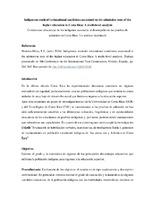Indigenous student's educational conditions associated to the admission tests of the higher education in Costa Rica: A multi-level analysis
Resumen
A group of researchers at the Instituto Tecnológico de Costa Rica (TEC) and the Universidad de Costa Rica (UCR) posed the question if the indigenous student’s cultural, linguistic and educational features could affect their performance on the admission tests for these state universities.
Objective: Estimate the degree and nature of some of the main educational disadvantages of the indigenous groups in their access to the higher education.
Methodology: This is an exploratory and descriptive research administered to a sample of 82 students in four different indigenous high schools, plus one rural (n=18) and other urban (n=153). The data collection was held from 2011 to 2012.
In the multilevel regression model, the first level variables were their age, traveling time, native language, self-classification ethnic and ethnic identity. The second level was the group’s cluster and kind of school. The dependent variables were the scores gotten from two specific tests and the admission tests (PAA) of the UCR and TEC.
Conclusion: The students from indigenous high schools, who are above the average age, tend to get a lower score at the admission tests. That is why their probabilities to access to a public college are less than the rural and urban group.
Fuente
9th Conference on the International Test CommissionCompartir
Métricas
Colecciones
El ítem tiene asociados los siguientes ficheros de licencia:



